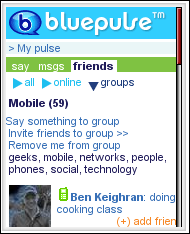 When I last looked at Bluepulse a year and a half ago, it was an Australian company with a Java ME based mobile widget platform. Well that has changed and Bluepulse is now headquartered in Silicon Valley (in YouTube’s old offices!) with a “social messaging” service. What’s that? Bluepulse describes social messaging as “as the love child of a social network and an instant messenger”, combining typical social network features like profiles, chat, friends, groups, photo and video sharing and a status update feed together with mobile messaging via SMS, email and the web.
When I last looked at Bluepulse a year and a half ago, it was an Australian company with a Java ME based mobile widget platform. Well that has changed and Bluepulse is now headquartered in Silicon Valley (in YouTube’s old offices!) with a “social messaging” service. What’s that? Bluepulse describes social messaging as “as the love child of a social network and an instant messenger”, combining typical social network features like profiles, chat, friends, groups, photo and video sharing and a status update feed together with mobile messaging via SMS, email and the web.
Although Bluepulse used to be a Java application it’s now a purely mobile web, SMS and email based product. It’s all on the mobile, there is a Bluepulse PC web site at www.bluepulse.com but it’s about Bluepulse with FAQ’s, help texts, privacy polices etc. To actually use Bluepulse including signing up, messaging, profile and group management you must do everything on the mobile site at bluepulse.com (without the www). The mobile site can be used from a PC, by the way, if you aren’t yet entirely comfortable with a purely mobile platform.
 Bluepulse’s meaasging interface is strikingly simple with a single inbox and outbox. If you want to message someone, you just type their phone number, email address, Bluepulse Login, full name or the name of a Bluepulse group into the to: field and enter your message (top image). Likewise you receive messages, friend requests and status updates all on the same screen on the Bluepulse mobile site or, if you choose, as text messages. This is true unified messaging, no modes, multiple inboxes or folders. In user interfaces simple is always best, especially on mobile.
Bluepulse’s meaasging interface is strikingly simple with a single inbox and outbox. If you want to message someone, you just type their phone number, email address, Bluepulse Login, full name or the name of a Bluepulse group into the to: field and enter your message (top image). Likewise you receive messages, friend requests and status updates all on the same screen on the Bluepulse mobile site or, if you choose, as text messages. This is true unified messaging, no modes, multiple inboxes or folders. In user interfaces simple is always best, especially on mobile.
Bluepulse seems to be the hottest of the new pure mobile social networks with over 3 million users in 160 countries and it recently received $6 million in seed funding from VantagePoint Venture Partners. In an interview with SFist, 26 year old Bluepulse founder Ben Keighran makes the point that Bluepulse is a:
“…mobile-only Internet service rather than a window or portal into a desktop Internet service. This differentiation is important because a service like ours is specifically designed to be consumed on a mobile phone and is not a half-baked or trimmed down version of a desktop Internet service/website.”
This is very true, the mobile sites of established PC based social networks like MySpace, Friendster and Facebook, are very limited compared with the full sites and have some serious usability issues as well.
Mobile is going to be a huge part of future of social networking. The major use of current social networking sites is to keep up with what friends are doing and to share experiences with chat, pictures and video. As phones become more powerful and “all you can eat” data and messaging plans become afforable, status and messaging (the core activities of social networking) will move away from the PC were we (hopefully) only spend a part of the day to the always available mobile phone. Networks designed from the ground up to be mobile are best positioned to profit from this shift.
BluePulse (bluepulse.com)
Content: ![]()
![]()
![]()
![]() Usability:
Usability: ![]()
![]()
![]()
![]()
Filed in the WapReview Directory under: Mobile Social
Related posts on Bluepulse from the Blogosphere
Robert Scoble – 50 minute interview with CEO Ben Keighran
Oliver Starr – Bluepulse Redefines Messaging, Socializing on Mobile
Hello admin I wanna ask what is the name of bluepulse online chat? Because they change it without even informing the youser on 2009 i miss my chat there.
I believe that Bluepulse shut down many years ago. WhatsApp, Telegram, Send and Line are today’s chat apps.
Bluepulse act as close as friend.
Bluepulse changes itself along with current fads in the market. It started as a bluetooth app, then switching to the widget model and now they’re a social messaging service.